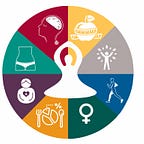What is Postnatal Depression and how you can cure it?
Postnatal Depression is quite common and usually, every one in ten mothers develops postnatal depression. The lack of family support and a hard pregnancy are the common reasons to develop this depression. However, support from your family or friend, or professional help can make you recover from this depression.
The entire pregnancy and post-pregnancy is a very emotional experience for a mother. You might face mood swings due to the physical and emotional changes happening in your mind and body. The main cause of feeling low and change in mood patterns post-childbirth include:
Postnatal Psychosis- A severe form of mental illness that might involve low mood and is quite uncommon.
Baby Blues- This is something very common among mothers post-pregnancy. Feeling weepy irritated, and anxious are some of its common symptoms that usually start around the 3rd day but usually go by the 10th-day post-delivery.
Postnatal depression (PND)- This is the most uncommon form of depression that occurs in about 1 in 10 mothers and starts to develop within the first four weeks and can last up to several months post-childbirth. This needs to be cured because if it remains uncured can result in a greater form of depression.
The common symptoms of Postnatal Depression
The symptoms of Postnatal Depression are quite similar to any other type of Depression and are there for most of the time and for a longer duration.
Low mood- A women tend to feel low in the morning, but it might not be always.
Don’t feel like enjoying- A women lose interest in herself and her baby and nothing seems good enough.
Don’t feel motivated to do anything, not even house-hold chores
Feels tearful and cries on small-small issues.
Gets irritated most of the time and feels guilty, rejected, and irritated most of the time in a day.
Results in lack of concentration such as forgetting things again and again and find it difficult to take any decision.
Sometimes a woman with Postnatal Depression even thinks about harming her baby. And if things don’t work out well then they might think of killing herself, however, that is very rare. If you know anyone having such thoughts you must support her and take her for consultation. Along with such thoughts they might also feel low in energy, have disturbed sleeping patterns, and have reduced sex drive.
What is the main cause of postnatal depression?
The exact cause for postnatal depression is still unknown and neither is it because of the hormonal changes after you gave birth. Usually, it is the stressful events post-childbirth and includes the responsibility of handling the child, feeling of isolation, and lack of financial, physical, and mental support from spouse and family members.
Some other reasons for developing a greater risk of postnatal depression include:
- If you had mental health issues in your past such as depression or schizophrenia
- If you were depressed or had marital issues during your pregnancy
- If you had a difficult pregnancy or had a major life event
- However, in many cases, there is no apparent cause.
What is the cure for postnatal depression?
As each individual is different and so the treatment also varies from person to person. Here are some of the factors responsible for curing postnatal depression:
- The seriousness of your depression and the type of symptoms, you have for depression.
- The impact of your symptoms on your capability to look after you and your baby.
- If you had any mental health issues in the past and how you have been able to deal with them.
Ways to cure postnatal depression are:
Support from family and friends- It is one of the best ways to help you recover from this depression. Talking to your close friends and family helps you recover soon and you might end up getting some help from your family and friends. You can also approach a health counselor to get out of this depression if it is not possible to seek help from your family. Sharing your problem with the counselor will help you address the issue well and will help you understand that you are not alone. There are many women who are dealing with postnatal depression. This will encourage you to deal with the situation and will help you to get out of depression.
Taking Medicines and Antidepressants- Taking medicines as prescribed, are another way to deal with postnatal depression. Especially if you have symptoms including low mood, poor sleeping patterns, or lack of concentration then antidepressants are given to help so that you can take good care of your baby. Ask your doctor to prescribe you antidepressants that are not harmful to your baby and don’t come in with breast milk.
Treating psychologically- It is about consulting a professional psychologist for better treatment. This includes Cognitive behavioral therapy (CBT), Guided self-help, Interpersonal therapy and problem-solving therapy, and psychodynamic psychotherapy. Based on your symptoms of depression your psychologist will refer you to the therapy that is best to cure your depression.
If you have a history of PND thus it becomes important to consult your doctor before planning your next pregnancy. About 3 in 10 mothers who have PND are at a greater risk of having prenatal depression when they have another baby. Thus, to avoid it in the future and for the wellbeing of you and your child, it is important to consult your doctor.
If you have a history of PND thus it becomes important to consult your doctor before planning your next pregnancy. About 3 in 10 mothers who have PND are at a greater risk of having prenatal depression when they have another baby. Thus, to avoid it in the future and for the wellbeing of you and your child, it is important to consult your doctor.
